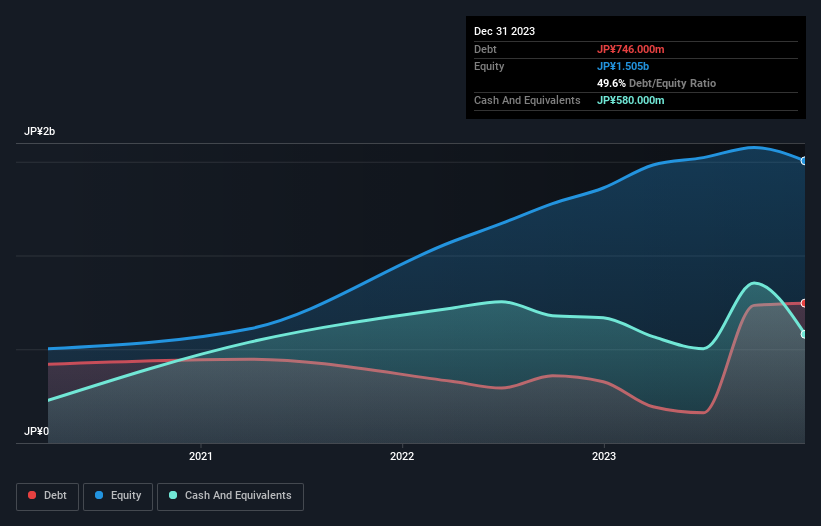
Legendary fund manager Li Lu (who Charlie Munger backed) once said, 'The biggest investment risk is not the volatility of prices, but whether you will suffer a permanent loss of capital.' So it might be obvious that you need to consider debt, when you think about how risky any given stock is, because too much debt can sink a company. As with many other companies HYUGA PRIMARY CARE Co.,Ltd. (TSE:7133) makes use of debt. But the real question is whether this debt is making the company risky.
Why Does Debt Bring Risk?
Debt is a tool to help businesses grow, but if a business is incapable of paying off its lenders, then it exists at their mercy. If things get really bad, the lenders can take control of the business. While that is not too common, we often do see indebted companies permanently diluting shareholders because lenders force them to raise capital at a distressed price. Of course, plenty of companies use debt to fund growth, without any negative consequences. When we think about a company's use of debt, we first look at cash and debt together.
See our latest analysis for HYUGA PRIMARY CARELtd
What Is HYUGA PRIMARY CARELtd's Debt?
The image below, which you can click on for greater detail, shows that at December 2023 HYUGA PRIMARY CARELtd had debt of JP¥746.0m, up from JP¥327.0m in one year. On the flip side, it has JP¥580.0m in cash leading to net debt of about JP¥166.0m.

A Look At HYUGA PRIMARY CARELtd's Liabilities
Zooming in on the latest balance sheet data, we can see that HYUGA PRIMARY CARELtd had liabilities of JP¥1.97b due within 12 months and liabilities of JP¥444.0m due beyond that. Offsetting these obligations, it had cash of JP¥580.0m as well as receivables valued at JP¥1.47b due within 12 months. So its liabilities total JP¥357.0m more than the combination of its cash and short-term receivables.
Since publicly traded HYUGA PRIMARY CARELtd shares are worth a total of JP¥12.1b, it seems unlikely that this level of liabilities would be a major threat. But there are sufficient liabilities that we would certainly recommend shareholders continue to monitor the balance sheet, going forward. But either way, HYUGA PRIMARY CARELtd has virtually no net debt, so it's fair to say it does not have a heavy debt load!
We measure a company's debt load relative to its earnings power by looking at its net debt divided by its earnings before interest, tax, depreciation, and amortization (EBITDA) and by calculating how easily its earnings before interest and tax (EBIT) cover its interest expense (interest cover). The advantage of this approach is that we take into account both the absolute quantum of debt (with net debt to EBITDA) and the actual interest expenses associated with that debt (with its interest cover ratio).
HYUGA PRIMARY CARELtd has a low net debt to EBITDA ratio of only 0.24. And its EBIT covers its interest expense a whopping 150 times over. So you could argue it is no more threatened by its debt than an elephant is by a mouse. Fortunately, HYUGA PRIMARY CARELtd grew its EBIT by 7.6% in the last year, making that debt load look even more manageable. When analysing debt levels, the balance sheet is the obvious place to start. But it is future earnings, more than anything, that will determine HYUGA PRIMARY CARELtd's ability to maintain a healthy balance sheet going forward. So if you're focused on the future you can check out this free report showing analyst profit forecasts.
Finally, a business needs free cash flow to pay off debt; accounting profits just don't cut it. So we clearly need to look at whether that EBIT is leading to corresponding free cash flow. In the last three years, HYUGA PRIMARY CARELtd's free cash flow amounted to 23% of its EBIT, less than we'd expect. That weak cash conversion makes it more difficult to handle indebtedness.
Our View
The good news is that HYUGA PRIMARY CARELtd's demonstrated ability to cover its interest expense with its EBIT delights us like a fluffy puppy does a toddler. But truth be told we feel its conversion of EBIT to free cash flow does undermine this impression a bit. We would also note that Healthcare industry companies like HYUGA PRIMARY CARELtd commonly do use debt without problems. Taking all this data into account, it seems to us that HYUGA PRIMARY CARELtd takes a pretty sensible approach to debt. While that brings some risk, it can also enhance returns for shareholders. When analysing debt levels, the balance sheet is the obvious place to start. But ultimately, every company can contain risks that exist outside of the balance sheet. We've identified 1 warning sign with HYUGA PRIMARY CARELtd , and understanding them should be part of your investment process.
At the end of the day, it's often better to focus on companies that are free from net debt. You can access our special list of such companies (all with a track record of profit growth). It's free.
Valuation is complex, but we're here to simplify it.
Discover if HYUGA PRIMARY CARELtd might be undervalued or overvalued with our detailed analysis, featuring fair value estimates, potential risks, dividends, insider trades, and its financial condition.
Access Free AnalysisHave feedback on this article? Concerned about the content? Get in touch with us directly. Alternatively, email editorial-team (at) simplywallst.com.
This article by Simply Wall St is general in nature. We provide commentary based on historical data and analyst forecasts only using an unbiased methodology and our articles are not intended to be financial advice. It does not constitute a recommendation to buy or sell any stock, and does not take account of your objectives, or your financial situation. We aim to bring you long-term focused analysis driven by fundamental data. Note that our analysis may not factor in the latest price-sensitive company announcements or qualitative material. Simply Wall St has no position in any stocks mentioned.
About TSE:7133
HYUGA PRIMARY CARELtd
Provides home-visit pharmacies, nursing, and care planning services in Japan.
Fair value with acceptable track record.


